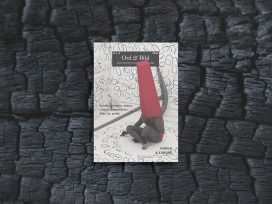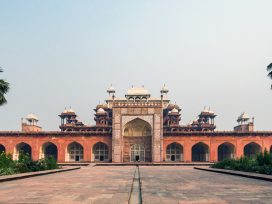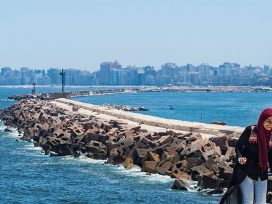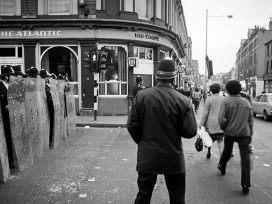I have a Spanish friend who worked in Oslo a few years ago. Recently, she asked me on Facebook what it was like now after the bombing and the killings. “I suppose the whole of Oslo must be full of police and soldiers.” I answered in all honesty: “No, but it’s full of roses.”
I also wrote that in the middle of all the pain and all the thoughts that were eating away at us and threatening to cloud our minds, there was a fantastic feeling of unity. “Life is different now,” I wrote without feeling this was an exaggeration: “Everyone is talking to each other; the city feels warmer and more inclusive than ever.”
Three days after the bombing of the government headquarters and the killings on Utøya, two hundred thousand people gathered in the centre of Oslo. Similar scenes were played out all over Norway, and almost everyone I know is talking about a new closeness, a new sincerity – a new society.
Of course this is a passing phase, such as you always get during revolutions. However, a revolution’s most important task is not to maintain this state but to ensure that it leaves a lasting impression on institutions that aim to safeguard the preservation of its most important resources for posterity. That is the task we are now facing. It is easy to fool yourself into believing that this work will be easier than it actually is or that the job will take care of itself now while we are still full of anger, grief and solidarity. But this is not the case. We have a huge task ahead of us, not only in ensuring that the survivors and the bereaved will be able to live with their grief, but also in patching our society up again.
State of innocence?
A large section of the international media who reported from Norway have used metaphors such as “a lost innocence” and “a wake-up call for sleeping beauty”. But they have overlooked two important factors: our naiveté has been self-imposed. And we have not been living in a state of innocence. A significant majority of us have chosen to create an open society which is perhaps vulnerable but for the same reason also strong. We have fully proven this in recent days, in spite of the fact that we have had our fair share of political violence here too. Not of course, on the same gruesome scale as we have now – few countries could claim that. But we have been aware of the danger and we have nevertheless chosen openness.
In its editorial on the Sunday after the attacks, the daily VG wrote: “The far right movement in Norway has always been marginal but at times it has been very dangerous. And it has been responsible for all acts of terrorism that have taken place on Norwegian soil.” I myself witnessed this at close hand in the mid-nineties. The media presented the conflict as gang warfare between the activists from Blitz (an Oslo-based “autonomous” youth house) and neo-Nazis. But it wasn’t. Norwegian neo-Nazis were at the time trying to win city space in the centre of Oslo and use it to terrorize immigrants and alternative thinkers. In several countries this has proven to be a good recipe for making the transition from sect to movement. They never managed in Norway, mainly thanks to how the neo-Nazis were confronted: initially by other young people in the streets, but eventually also by parent groups, and through some extremely successful police work that focused on outreach and preventative initiatives.
The slogan then was “the street is ours”, a slogan that aroused mixed feelings in me. Since the neo-Nazis represented an ideology of violence, the confrontations often ended in violence. I have friends who were attacked with axes and shot at while they waited for the bus outside their apartments, or were shot by neo-Nazis who pulled out weapons during street battles. The youth house Blitz was the target for several serious bombings, one of them during a concert where the loss of life could have been immense. The last bombing could also have taken several lives, but, by coincidence, the bomber hit the barbed-wire fence that separated the backyard from the street and the bomb landed on the wrong side.
We have experienced bomb attacks against Labour Day marches, firebombing of immigrant shops and the Hadeland Killings. In both our Scandinavian neighbour countries neo-Nazis have killed homosexuals, socialists and syndicalists, and in Sweden two “laser men” have terrorised and killed random immigrants. One follower of the Norwegian neo-Nazis – now a born-again Christian – who is currently serving a life sentence for violent crimes, testified that in the nineties they were working on a plan to carry out a machinegun massacre of Blitz youth activists and members of the Anti-Fascist Action group. And finally we have the tragic racist killing of 15-year-old Benjamin Hermansen, which marked the end of organized neo-Nazism in Norway.
Mutated rightwing extremism
Mathias Waag from the Swedish Research Group writes in his analysis “The Executioner from Comment Field” that we no longer have one kind of rightwing extremism but several. He describes the most significant new form as “an extreme right wing who acts on a European level as opposed to a national one, is pro-Israeli and pro-Zionist as opposed to anti-Semitic, is Islamophobic and culturally racist more than racially ideological, who sees the battle for culture as a significant arena and typically dresses up his rhetoric in supposed ‘anti-racist’ language instead of the cumbersome and stigmatized rhetoric of the extreme right”.
Breivik’s manifesto contains elements that can be found in a range of Norwegian milieus: Honestthinking.no, Document.no and Nyhetsspeilet.no are among the most significant. Several of these are part of a European blog network that has grown over recent years, with Gates of Vienna, Brussels Journal and the Norwegian “Fjordman” as key names. According to them, they are engaged in a culture war and claim they are being persecuted. This culture war is a prelude to the real war, which is often described in military terms. While traditional far-right extremism and neo-Nazism were concerned with presenting themselves as powerful and dangerous, the most important weapon for these culture warriors is the role of the victim. In their eyes, they are fighting against an all-consuming political correctness administered by the “European elite”. Many of them have long since resorted to conspiracy theories and paranoia.
Perhaps it is precisely here that the biggest responsibility rests with the Progress Party. Of course the party has nothing to do with fascism, Nazism or violent far-right extremism. But ever since Carl I. Hagen renamed the Norwegian National Broadcasting Corporation (NRK) “the Labour Party’s National Broadcasting Corporation” (ARK), the party has cultivated an interpretation of reality where especially “the social-democratic elite” stifles public debate and obstructs free speech. Such attitudes were perhaps justified in the past when the societal climate was different. But in recent years, nothing has been further from the truth.
The Progress Party is of course not alone in having contributed to this narrative about the absence of political influence through existing democratic channels, and it has its left-wing supporters too. For anyone who has read the pamphlet entitled The Coming Insurrection it is easy to find parallels to Breivik’s dystopian universe, although it is free from the kind of conspiracies and paranoia that make an act of political terrorism a foregone conclusion. A wide net must be cast in confronting such doomsday prophets, and we should perhaps heed the words of the Danish social democrat Svend Auken: In the last interview he gave before his death, he defined Social Democracy as “a confrontation with passive victimhood; the notion that it is the others who decide, and we can only be mad at them and write songs but we cannot do anything ourselves. We are just servants. We are just ordinary workers. This notion of victimhood is returning with globalization. The Danes are once again turning into spectators.”
Auken is here pointing not least to the growth of the ardently xenophobic Danish People’s Party which has perfected the same aggrieved victim rhetoric that the Progress Party has cultivated in Norway. Political parties such as the Progress Party have to confront this type of rhetoric and take seriously the ways in which it has contributed to the creation of a climate of debate that is toxic, in which it is difficult to change opinions in an appropriate manner: through argumentation, facts, and in an unbiased tone.
How the rest of us should relate to these ideas is trickier. The fact that they are so loosely grounded in reality makes it difficult to subject them to rational arguments, and their malicious tone is not conducive to dialogue. Nonetheless, we have to do everything in our power to avoid a revenge-oriented debate in which these influences get swept under the rug.
In addition to the blogosphere, neo-fascist, rightwing extremism has acquired a political style of expression. Since these groups have so far not made any real progress to speak of in Norway, they are often regarded as insignificant. However, developments in other countries suggest that they should not be dismissed out of hand. Those deserving particular mention include the Norwegian branch of the “Stop Islamisation of Europe” (SIAN) Network. In England, the English Defence League (EDL) has grown into a movement, and there has been a recent, not very successful attempt to establish a branch on Norwegian soil called the Norwegian Defence League. And the American Tea Party movement has also sprouted a Norwegian branch.
Hans Rustad’s Document.no, established in 2003, should not be overlooked here. Breivik was an active contributor to the forum and also took part in the seminars they arranged. In the forum he has, amongst other things, spoken in favour of establishing Norwegian branches of the EDL and the Tea Party movement. When the Progress Party’s Kent Andersen and Christian Tybring-Gjedde wrote a feature in Aftenposten in which they warned that multiculturalizm “may rip our country to shreds”, this was discussed on Document.no under the heading “The Beginnings of Resistance?”
The progress party
I have already mentioned the Progress Party, not out of any desire for revenge or because I am filled with hatred. The party’s vice president Per Sandberg claimed as much in response to Petter Nome’s and Per Fugelli’s criticism of the party for having created an intolerable climate for debate. On NRK Radio, Sandberg compared those who had criticised the party with the young people on Utøya and the love they showed, and marvelled at how anyone could be “so full of hate”. Party leader Siv Jensen had said some days prior to this that the claims of any connection between the Progress Party and Anders Behring Breivik was just as bad as the mass killings. It was probably just an unfortunate slip of the tongue, and an apology has since been issued. But it was no coincidence. It happened precisely because the party is so used to perpetually taking on the role of victim that it by now is a knee-jerk reaction, even when in reality the wronged party is someone completely different.
While we should not acknowledge the Progress Party as a victim in public debate, we must avoid behaving in such a way that they actually become precisely that. A thorough confrontation with a number of aspects of the party’s ideology and philosophy, without demonizing the party or its voters, will be an extremely important and difficult task and requires a measure of caution and a respectful approach. Unfortunately, this is not made any easier by the fact that the party itself continues to trivialize the links. The Progress Party’s Commissioner for Transport in Oslo, Jøran Kallmyr, said to Aftenposten on 28 July: “We must not allow Breivik to have the power to define Norwegian politics. He is a madman, not a philosopher.” This is possibly a case of the pot calling the kettle black since they were both members of the same local branch of the Progress Party, but his warning against “placing too much emphasis on the political elements” of Breivik’s manifesto must also be seen as an attempt to elude all the uncomfortable questions that are now being directed at the party.
Member of Parliament Per-Willy Amundsen, provides an example of the vast scale of the clean-up job the party is facing. On 1 April this year, he twittered about an interview on the Skavlan talkshow with Cat Stevens, who converted to Islam and changed his name to Yusuf Islam. “I feel slightly nauseous watching Skavlan’s attempt to render Islam harmless with Yusuf Islam on the national TV channel,” he wrote. A subsequent comment, removed after attracting slightly too much attention, culminated in the words: “I fear that a new crusade will be necessary.” Over the last six months prior to 22 July 2011, I sporadically followed Amundsen’s Facebook page. It served up a great deal of crude reading and Amundsen was extremely liberal in terms of what he allowed to remain on the page. All that changed after 22 July 2011. His Facebook profile was removed. The reason is probably that Amundsen, before the identity of the terrorist was known, wrote and uploaded a post which read: “Today is a dark day for the nation of Norway. Let us hope that not many were killed.” The leader of The Norwegian Patriots in Rogaland, Torgeir Bjelland, responded two minutes later: “Or at least hope that the dead are immigration-friendly socialists.”
Such things could have been dismissed as marginal and insignificant, had it not been for their scale. And it was none other than Party Leader Siv Jensen (whose Facebook profile has also been removed) who introduced the term “the creeping Islamification” of Norway. Her predecessor, Carl I. Hagen, has frequently drawn attention to himself with extremely crude comments in public debates, among them assertions claiming the existence of a Muslim drive towards world supremacy: “the Great Caliphate”.
Fortunately, there are also some honourable exceptions that give grounds for hope. The party’s Mayor of Askøy, Knut Hanselmann, said to BT (28 July) that they have to stop talking about culture and about society being torn to shreds, adding that “the kind of language used should be completely different and more impartial”.
Criticism must be allowed
An important prerequisite for successfully challenging the Progress Party’s rhetoric must be that they are not be the only ones in the dock. The Conservatives’ Hallgrim Berg has, for example, penned the books Europe in Danger and Letter to Lady Liberty. In the latter, he claims that Islam is in the process of conquering Europe and transforming it into a Eurabia through “a combination of oil money, emigration, birth rate, exploitation of democracy and tolerance, threats, cultural pressure, boundless terrorism and thousand-year-old patience”. This is what Breivik refers to as the “deliberate demographic warfare” and “indirect genocide” carried out by the Albanians and the Bosniacs against the Serbs, whom he sees as a vanguard in this war. Historian Nils Rune Langeland, associate professor at the University of Stavanger, said in Dagbladet a week before the attacks (15 July), in connection with the launch of the book Europe – A Crusade, that: “I believe Northern Europe will be the battleground. Remember that a successful example of the integration of other cultures in Northern Europe does not exist.”
While it is important to expose such arguments to the light of day we have to avoid creating a climate of debate in which all criticism of Islam or Norwegian immigration policy is unacceptable. So far I have not heard anyone claim anything as absurd as this, just people (myself included) warning against it. But there are hardcore Islam-critical groups who in the name of criticizing religion see Islam only as a religion, not an ideology. There is an important division here between those who believe “moderate” Islam is a solution, and those who think Islam inevitably leads to war and who therefore, with logical consistency, have already begun preparations. For example, in Denmark there is a neo-fascist organisation that runs firearms training sessions once a week. To get such groups to be open to counter arguments is part of the difficult job we are facing. The right wing political establishment has a huge responsibility here.
Norwegian Psycho?
No matter how much we analyse the conceptual world of the perpetrator, isn’t it in reality simply the case that he is mentally deranged? Parts of his manifesto are more reminiscent of the fictional character Patrick Bateman in Bret Easton Ellis’ American Psycho than a political ideologue. For example his lists of favourite clothing brands, after-shave and other consumer habits: he prefers Lacoste (and turned up to the first prison hearing in a Lacoste sweater), wears Chanel Platinum Egoiste and supported the west-end football clubs Lyn and Bygdøy Ballklubb.
At first glance, the manifesto seems like an unfortunate blend of ideology and megalomania. But these are not necessarily opposites. They are fused in the writings of Ayn Rand, the only writer in Breivik’s list of favourites to have more than one of their books mentioned. I have recently read books he refers to, Atlas Shrugged and The Fountainhead, the reason being that over the years I have noticed how when Progress Party politicians are asked about their favourite books they often mention these titles. When the first reports about Breivik came out, I was unable not to think about Rand’s characters which scared the life out of me when I read the books. The characters are narcissistic, megalomaniac elitists, like the genius architect Howard Roark in The Fountainhead. Towards the end of the book he delivers his defence to the jury after having been indicted for blowing up one of his own buildings. I have a nasty feeling that Breivik harbours lively delusions about a similar platform when his case is called, when he, like Roark, can accuse “collectivism” of having “broken loose” and of “running amock”: “It has brought men to a level of intellectual indecency never equalled on earth. It has reached a scale of horror without precedent. It has poisoned every mind. It has swallowed most of Europe.”
Is anti-socialism a disease?
Attempting to characterize the pathology of the terrorist is no job for the layperson. Nevertheless, several right wing figures are now trying to avoid the perpetrator’s 1500-page long manifesto becoming the subject of political debate, citing precisely these kinds of home-grown diagnoses. The attempt by hacker group Anonymous to destroy the manifesto is a better intentioned if not particularly a more intelligent attempt to silence the political terrorist. Breivik’s ideas have to make their way in the world and be met with the criticism they deserve. The attacks would have been inconceivable without ideological conviction, and even if Breivik’s rehashing is unique in its composition, it contains key elements that are shared by so many of us that we have to relate to it on a political level.
So far, a great deal of focus has been put on Breivik’s fascination with the Knights Templar, computer games and freemasonry. This provides a lot of good material but says little about his motives. All medieval figures mythologize and mystify something far more banal: Islamophobia and anti-Socialism. Or, to turn it on its head: Christian conservatism and economic liberalism, united in a dream of a re-feudalised Europe governed by a nobleman with Breivik himself in the role of warrior king.
There is much to indicate that in Breivik we are witnessing the first rightwing extremist terrorist to be just as much preoccupied with the free market as hatred against Islam and Muslims, as much with Ayn Rand as with Fjordman. It is a terrorism based on an intense hatred of social democracy, such as we saw in Sweden in the years before Palme was murdered, whereupon it disappeared from the public arena for a while. Breivik himself quotes writers who have depicted Sweden as a totalitarian society. If he had not committed those atrocities he would probably have been dismissed as an upper-class brat full of hatred for the “Labour Party state”.
These elements must not be lost in the political showdown because they are malicious, unrelenting and dangerous. I can remember how every week my uncle, who was janitor at the school I went to in Asker, had to remove death threats, hangman drawings and abusive comments from cupboards and desks – directed against the tiny handful of like-minded to which I belonged. The ardent class hatred aimed at those who were seen as “socialists” scared me back then, and it is no less frightening today.
An ex-colleague from the University of Copenhagen wrote, like so many other people I know abroad, a condolence email after the killings. She wrote:
I heard the news at the airport, where I was seeing off a Danish-born American. Her father emigrated after a childhood marred by his social-democrat father beaten to vegetable pulp one Labour Day in the 1930s by a right-winger, and they nursed him at home for several years, in poverty. I wonder how far have we have actually come?
The terrorist has already lost
The terrorist may be able to read and write, cut and paste, but he cannot have understood much about the society in which he lived, or about human relationships and reaction patterns. Although he has insisted to his defence counsel that he doesn’t care about immediate reactions and is thinking from the standpoint of a “60-year perspective”, he probably did not predict the kind of peaceful and dignified reaction his abhorrent actions would receive. Even if Breivik would most probably like to take over the courtroom in the style of the Ayn Rand character Howard Roark, he will in all probability end up as his polar opposite, the philanthropist Ellsworth Monkton Toohey. In his own eyes this will perhaps be his greatest defeat. In her notes, Ayn Rand described the character of Toohey as “the worst of all possible rats” in terms of his altruism, philanthropy and leadership qualities. It is however not the rat characterization that is striking – although such dehumanizing metaphors are repugnant. No, there is another description of Toohey that strikes me as particularly applicable to Breivik after having read his so-called manifesto: the failed superman. Rand describes the character as one lacking “a creative mind, only a repeating, aping, absorbing ‘second-hand’ one”.
A society in solidarity
The last time far-right extremism went underground in Norway, they themselves dealt the finishing blow. Is there reason to believe that the same has happened now? That remains to be seen. It is important to remember that Breivik did not address “most people”, only those he regarded as the elite. His aim was to radicalize the radical right, something in which he might still succeed. However, it is absolutely certain that the terrorist has strengthened those he set out to weaken. At the prison hearing he said his aim was to “cut off recruitment to the Labour Party”. The opposite has happened.
His actions were experienced as an attack on “us all” and it was, in all its inhumanity: we were united as human beings and members of society. But at the same time, it was an attack on the labour movement and the Left, those he calls “cultural Marxists”; to the killer it was this, first and foremost. If we lose sight of this in all the solidarity on display, we risk learning almost nothing; we cannot afford not to learn from this.
Now we have to make sure that the first “Ayn Rand terrorist” is also the last. We have to try to establish a dialogue with those who have no desire or ability to listen to voices other than their own. Precisely because this field is now so packed with emotion it is vital to base the debate on knowledge and facts, and for confrontation to be about conceptions, ideas and forms of debate, not about who is to blame for the attacks.
In the last two weeks, we have proven that our society is strong, united and civilized. Could we have concluded the same if Islamists had been behind the attacks? Would we have passed the test then? I believe so but I can’t be completely sure. In the hours during which most of us still thought that Islamists were responsible, there were reports of attacks on immigrants, Hitler salutes and racially-abusive language. Immigrant friends say they were scared stiff that they would lose the last bit of breathing space they had in an atmosphere many of them have experienced as extremely hostile in recent years. I still hope and believe that we would have made it through this too.
The task now is to become so strong that in the future we will also be able to deal with external attacks too – not only those from our own right wing – with the same courage and defiance. The Rose Revolution spreading across Norway instils hope that this is possible. As in other revolutions, one should not believe that changes will bring an end to differences or that opponents will give up. Neither is that the goal. The goal is a more open and inclusive democracy in which everyone feels able to breathe and where differences are not boiled down to deadlocked positions and allegations about hidden agendas.
One thing is for sure: I no longer have mixed feelings about the slogan “the street is ours”. Not after taking it back in the company of two hundred thousand people carrying flowers.






